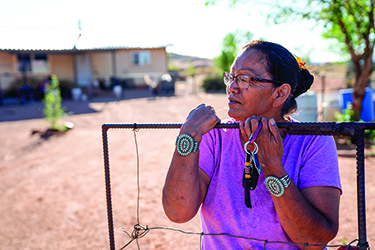People living in rural areas can struggle to access good health care, a problem often amplified for vulnerable populations groups. Because of this, rural residents are sometimes left out of health and medicine research.
Enter the All of Us Research Program, which is building a health and medical database that focuses on underrepresented groups, which includes people living in rural communities. By knowing more about the health issues of people in rural areas, interventions and therapies can be developed to better serve the population.
The National Rural Health Association has partnered with All of Us to increase enrollment and engagement among people in rural areas. The Nation’s Health spoke with NRHA President Kevin Bennett, PhD, about that work.
Why is NRHA involved in All of Us?
NRHA is interested in making sure that rural populations have equitable access to health care services. We advocate quite a bit for the traditional health care delivery side of things. But there's also this public health side that I think is overlooked. It's a double whammy when you're talking about rural public health. It's under-resourced and under-provided.
In a lot of large databases and surveys, rural tends to be underrepresented because there’s fewer folks, they’re harder to get to, more expensive to get to and they have limited budgets. The opportunity to work with All of Us more directly — to really get the rural enrollment up — is very exciting.
How does NRHA recruit rural residents as participants?
We've been trying to host or facilitate actual sign-up events. If there's a rural health conference, we'll try to get a sign-up event at the conference. I've also been working to get the word out among researchers across the country to utilize the resource. Our strength is in our network of partners across the U.S., whether it be hospital systems, community-based organizations or rural health associations. NRHA is seen as a trusted partner for a lot of those groups. We don't have the manpower to sign up people directly. But we have manpower to set up a sign-up event at a conference, webinar or distribute materials.
What are common health and medical challenges for people in rural areas?
It's not all that different from anywhere else. But you do see obesity, diabetes and hypertension. Those are the big three.
There's an elevated risk that we have more than one chronic condition in greater numbers and greater proportions, which amplifies their risk for further disease and repercussions. Due to the lower levels of access, some of these conditions are found later. So you might have undiagnosed diabetes for longer, which does more damage and leads to further effects down the road.
The All of Us research Program “sees participants as partners.” What does that mean to you?
A great example is that I am a participant myself. I was like, “Yeah, I'm gonna sign up to do this and contribute my information to the cause, while also advocating for other folks to sign up.” I'm not going to ask somebody to sign up for something if I'm not willing to do it myself.
I liked the way they've taken this viewpoint of empowering participants to spread that word and get others to sign up as well. Getting more friends and family to sign up across their networks is going to be a lot more effective. We have the saying here in South Carolina: ‘If Grandma's not doing it, it's not happening.’
Why is it important for people in rural areas to be a part of All of Us?
Rural is white. Rural is black. It's Hispanic, it's LGBTQ+, it's veterans. It’s easy to lose sight of these rural subpopulations. I don't think people think about rural LGBTQ+ communities and how much harder it is for them to get health care, timely care and appropriate care. Our rural veterans have access issues as well. A large portion of our military comes from rural.
It's important to understand what that dual disparity is if you're rural plus. That puts you much further behind the eight ball in access, outcomes, timely care and mortality. That's why we need to make sure we get the right folks to see what's actually happening and not just try to extrapolate data from urban and suburban populations.
Researchers are actively using All of Us data in scientific studies. Are there any findings that you see as particularly beneficial for people living in rural areas?
The All of Us dataset does not include adequate geographic markers for us to do true rural research yet. They have the potential for it, but there are a lot of privacy concerns that we're trying to work through. Rural research has been sparse because of that limitation.
Once we cross that hurdle, which I know they are actively working on, I think it's going to take off. There's a large group of us that are ready and waiting to do the rural crosstabs.
Ultimately, you really want it (data) to inform policy or interventions. If there's a million people in it, we can identify pockets of need, and then extrapolate it. That's going to be very powerful for health systems, for policymakers and for public health professionals to design programs to meet those needs.
Photo by Grandriver, courtesy iStockphoto